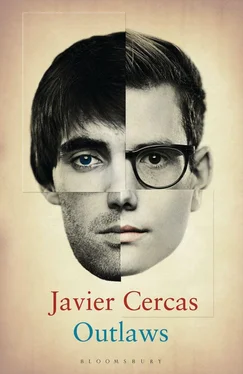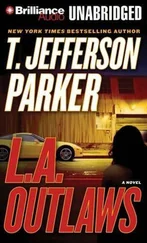‘That happened on a Monday. The following days were euphoric. I started showing up for work with the same joy as in the early years, I flirted with a young attorney at the courthouse and a couple of times went to the Royal for a few beers with Cortés and Gubau after work. This state of light-heartedness vanished suddenly on the Thursday morning, when Tere showed up unannounced at the office. She’d barely changed in those three years: she was dressed in her eternal teenage style — jeans, white shirt and handbag strap slung across her chest — and her hair was still damp and uncombed; she seemed very happy to see me. I, however, could not and did not want to hide my annoyance; without even saying hello I asked: What are you here for? Instead of replying, Tere gave me a fleeting kiss on the cheek and, before I could invite her in (or not), stole into my office. She sat down on the sofa. I followed her, closed the door and stood across from her. Zarco’s written to you, hasn’t he? she said straight off the bat. I answered her question with another question: Did he tell you that? No, she answered. He gave me the letter and I left it in your mailbox. At that moment I understood why Zarco’s letter didn’t have Tere’s address or phone number: it had been written for her to hand to me in person. And why didn’t you come up and give it to me? I asked. I didn’t want to overwhelm you, she answered. I thought you should have a few days to think it over. I nodded and said: No need. There’s nothing to think about. I’m pleased to hear it, she said. Don’t be pleased, I said. I don’t plan on falling into the trap again. What trap? she asked. You know what trap, I answered; then I added a half truth: Being his lawyer. It’s not a trap, she said. And I don’t understand why you don’t want to help him. The question isn’t why I don’t want to help him, I argued. The question is why should I help him. Because if you and I don’t nobody will, she answered. He’s completely alone. Well, he’s earned it, I replied. When we tried to help him it did no good at all; or rather: all it did was fuck us all up and make us waste our time and money. As far as I know, the only one who got fucked over was him, replied Tere. Oh, yeah? I said. I was about to reproach her for leaving me, I was about to tell her about my depression; I spoke of María. What’s wrong? I asked. Don’t you watch TV, don’t you see any magazines, don’t you go outside? Have you not heard about the mountains of shit María has piled on top of us? That’s water under the bridge, replied Tere. It wasn’t true, but almost; although over the last year María hadn’t disappeared from the media, her star was fading: she still showed up on the odd chat show and sometimes appeared in the gossip magazines, but she was no longer a relevant figure in the media circus, her story and her celebrity were wearing out and, in spite of her efforts, she seemed incapable of reviving them. Tere continued: Besides, it was all lies. Not all of it, I corrected her. Almost all, she conceded. And nobody pays her any attention any more. They didn’t before either. Don’t you realize it’s all a comedy and everybody knows it’s a comedy?
‘She fell silent. I did the same. I was upset and didn’t want to argue with Tere: I just wanted to get the matter out of the way swiftly, without giving her time to use any wiles to make me vulnerable again and make me accept her suggestion. I sat in one of the armchairs, beside her, still on the sofa, watching me expectantly and almost still, except for her left leg moving with its unstoppable piston rhythm. Look, Tere, I began. I’m going to tell you the truth. I’m fed up with this story. I’m fed up with Zarco and with you. With both of you. You tricked me when I was a kid and you’re deceiving me now. You think I don’t know? You think I’m an idiot? Zarco was right: I have made a ridiculous fool of myself and been a dickhead and a wanker and let myself be used. And I’ve suffered a lot. I loved you, you know? And I suffered like an animal when you left me. I don’t want to suffer any more. It’s over. Understand? It’s over. I don’t want to have anything more to do with you. Not with you and not with him. Don’t ask me to defend him again because I’m not going to. No way. I don’t want to know anything more about Zarco. And, if you had any sense, you’d do the same. He’s made you make a fool of yourself too. He uses you too whenever he feels like it. But have you really not figured out what a fucking son of a bitch he is, as well as a pathological media whore? Tere had been stroking the mole beside her nose, her head had slumped between her shoulders and her eyes fixed on the parquet and her gaze turned inwards. Meanwhile I went on cursing her, more and more upset, her and Zarco; I swore at them until I realized Tere was saying or murmuring something. Then I shut up. Tere repeated: He’s my brother. An absolute silence filled the room. I’d heard perfectly, but I asked: What did you say? Tere looked up at me: her green eyes were empty, inexpressive; three very fine lines had just appeared on her forehead. That he’s my brother, she repeated. His father was my father. We don’t have the same mother, but his father is my father. She looked at me, touched the mole beside her nose and shrugged in a gesture that seemed like an apology, but she didn’t say anything else.
‘I didn’t know what to say either, so I stood up from the armchair and took a few steps towards my desk; when I got to it I turned back towards Tere. Is that true? I asked. Tere nodded. It can’t be, I said. Tere kept nodding. Nobody knows, she explained. My mother and his mother. And me. No one else. What about Zarco? I asked again. Zarco neither, she answered. My mother told me we were sister and brother when he showed up in Gerona, not long before we met you. She told me because Zarco and I were always together, she knew we loved each other a lot and she didn’t want anything to happen between us. She fell silent, pensive, or perhaps as if not knowing what else to tell me, or not wanting to tell me. I asked another question: Why didn’t you tell Zarco? What for? she answered. It was enough for one of us to know. And I could live with it, but he might not have been able to: he’s weaker than you think. And had you. .? I asked. I realized Tere was crying: big fat tears started rolling down her cheeks, falling onto her shirt and leaving little wet spots. I had never seen her cry. I sat in the armchair, beside her, I held one of her hands: it was damp and warm. We were just kids, she said. We didn’t know what we were doing, nobody ever told us anything, you know? She kept crying, without mopping up her tears, as if she hadn’t noticed she was crying, and I understood she wouldn’t say anything else.
‘For a while we sat in silence; I ran my fingers over her knuckles with my mind blank: I didn’t even think that here was a real misunderstanding, only a resolved misunderstanding, and that now, probably, everything did fall into place. When Tere stopped crying and started wiping her face with her hands I stood up, left the office, came back with a packet of Kleenex and gave her a few. Sorry, she said as she dried her eyes. I don’t know why I told you that. She finished tidying herself up, looked at me. Then she looked away and we were quiet for a while longer. She blew her nose and dried her tears; I had been left speechless. At a certain point she said: Well, I do know why I told you. What I told you is the truth: Zarco has nobody; you and I are all he has left. And he’s ill. She turned back towards me, her eyes still shining: You’ll help him, won’t you?’
‘When Gamallo got his pardon and the conditional release and left the Gerona prison with everyone’s felicitations, I hoped it would be the last I’d see of him. A short time later he committed another crime and was sent to Quatre Camins Prison, but still I hoped. I was mistaken. His lawyer was to blame for everything.
Читать дальше












